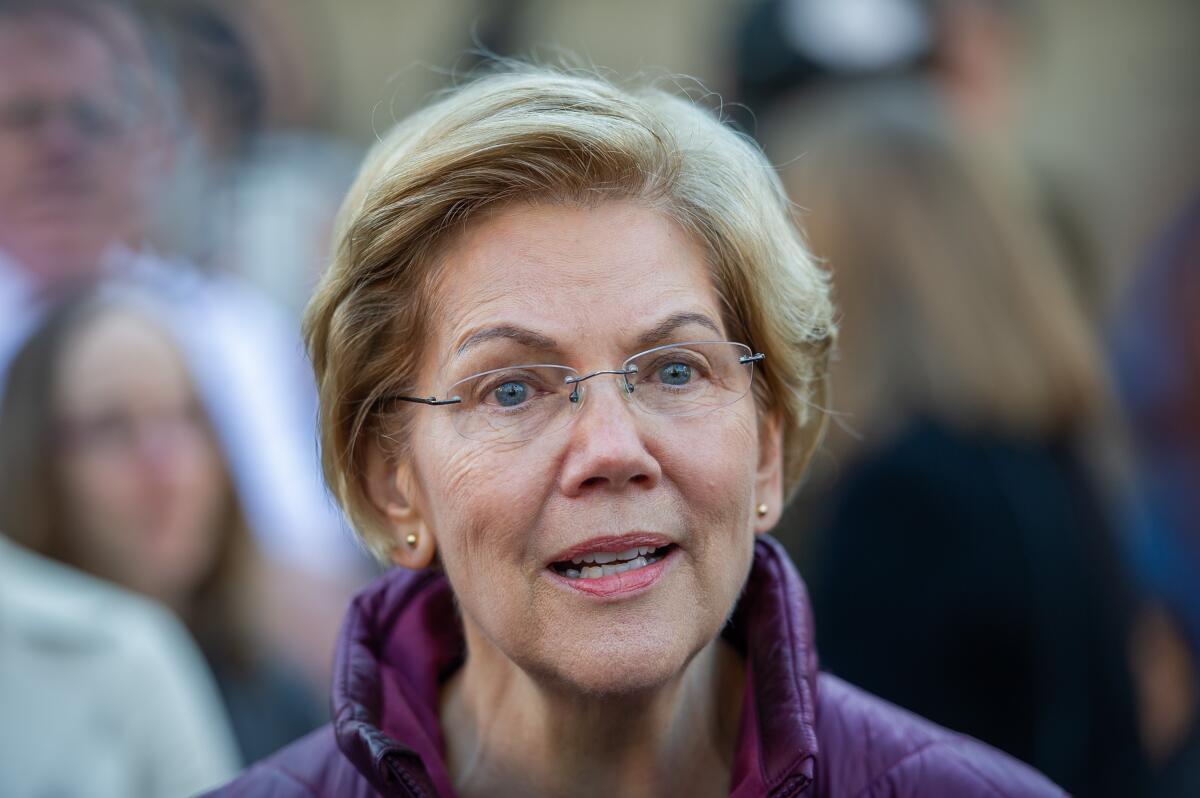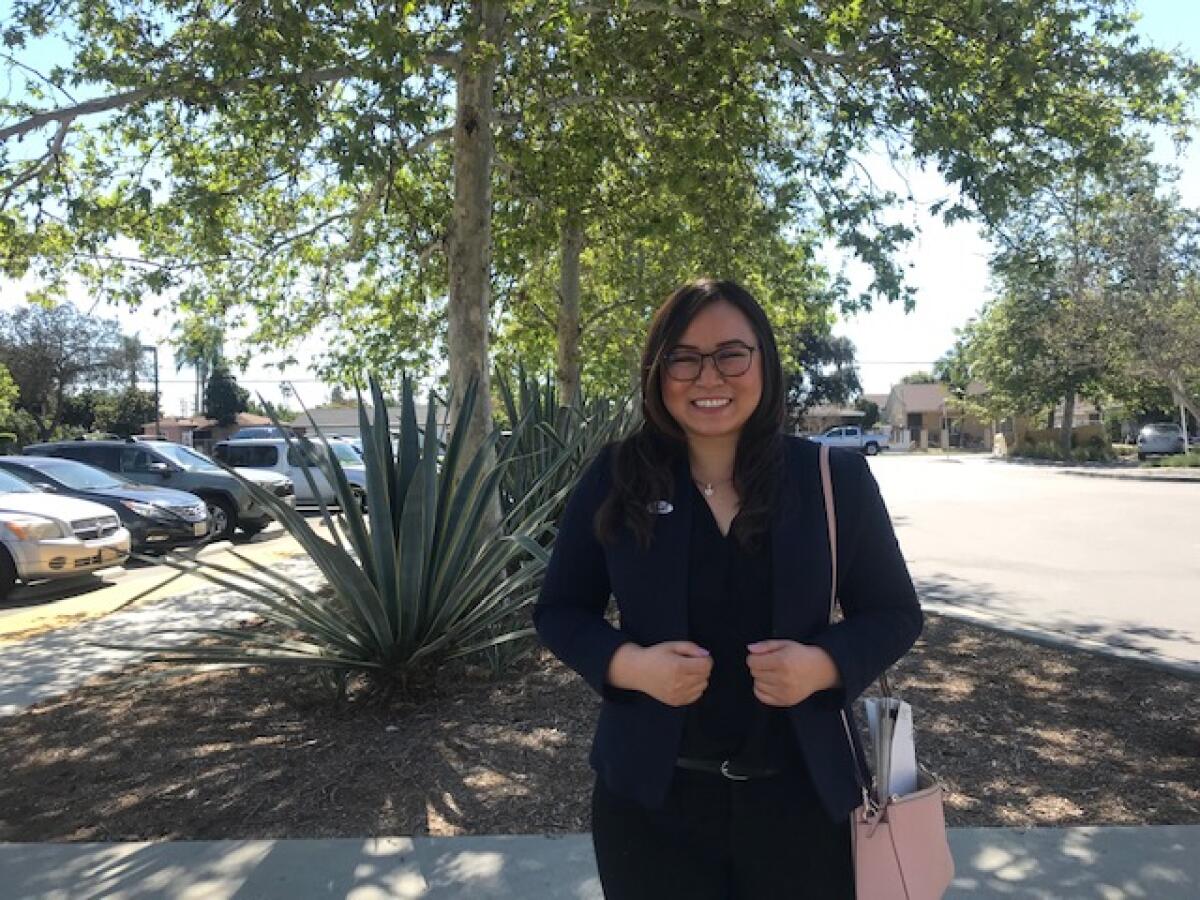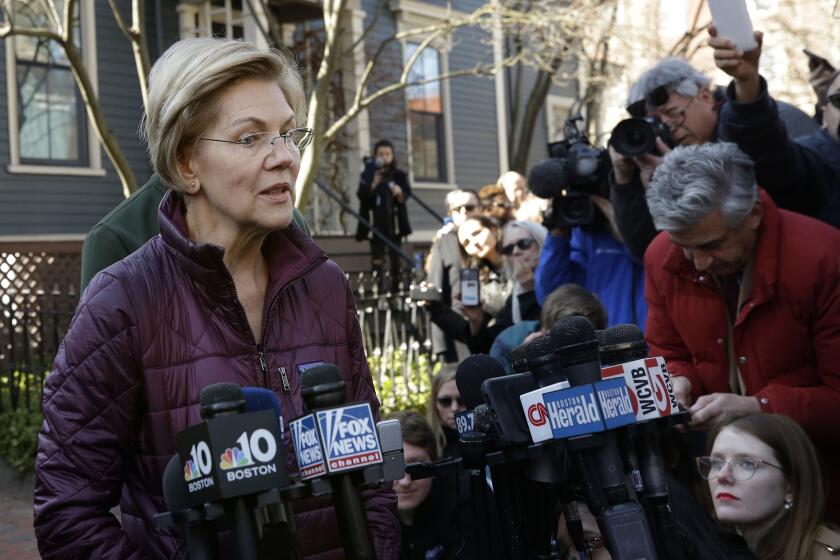Another campaign, another disappointment for women as Elizabeth Warren bows out

- Share via
ATLANTA — Just a few days ago, Vanessa Jackson marked the spot beside Elizabeth Warren’s name on her Georgia ballot, hopeful she was casting her vote for the first female president of the United States.
So when the news flashed on her cellphone Thursday that Warren had bowed out of the Democratic race, she groaned. The contest was down to two white men. The highest glass ceiling in the land will remain firmly intact.
“Can we talk about the fact that we have never had a woman president and what that means?” asked the 59-year-old Atlanta social worker, who voted early ahead of Georgia’s March 24 primary.
Jackson didn’t fault Warren, saying she had long admired the Massachusetts senator’s fierce intellect and the ability the former Harvard professor had to make complex policy accessible.
“I am more disappointed in our country,” she said. “The bottom line is this woman is the best leader we can have at this moment … levels above her male counterparts — and somehow that still doesn’t matter. It’s so weird. What would have to change in the American psyche to accept the ultimate leadership of a woman?”
Women across the country wondered the same thing.
For many, Warren’s exit was a familiar punch-to-the-gut moment of disappointment tinged with anger: a presidential campaign where a class of capable, highly accomplished female candidates was passed over for two men who look like just about every other one who’s ever held the office.
“It’s a sad day,” said Christina Reynolds, a spokeswoman for Emily’s List, a political action committee that backs pro-choice women.
For some it was all the sadder because, for a time last year, a record six women were running for president. (The sole remaining contestant, Hawaii Rep. Tulsi Gabbard, has never been a serious competitor.)
Yet, like other women, Reynolds said she was not really surprised that, in an election with electability at the fore — and a constant stream of commentary suggesting women were not electable — voters would reject a female candidate in favor of two men, Joe Biden and Bernie Sanders, who’ve run nationally before. Each started with a strong base of support.
“What you heard through the bulk of the race was that women were a risk, that the safe bet was not a woman,” Reynolds said.
Warren has dropped out of the presidential race after failing to bridge the Democratic Party’s left and right behind her ambitious agenda.
Gender aside, there were tactical errors that undermined Warren’s candidacy, perhaps the most significant being her handling of Medicare for all.
Pressed by rivals to explain how she would pay for universal healthcare, Warren issued a plan costing trillions of dollars. When that was criticized, she backed off by calling for a go-slow approach, thus managing to alienate both liberals and centrists.
Defenders were quick to note that Vermont Sen. Sanders has managed to get by with vague promises about how his plan would be financed.
Some Warren’s supporters said they believed she was the sharpest, steeliest candidate and were sad — but not at all shocked by her exit.
Nicole Jarred, who runs a social justice consulting firm, cast her vote for Warren after a lot of back-and-forth with her husband over whether to support the candidate they believed in or former Vice President Biden, the candidate who seemed like the one the rest of the Democratic electorate preferred.
“We felt like it was an impossible choice,” said Jarred, 38, of Sacramento. “Do you vote with your heart and your vision and values when you’re almost certain misogyny is going to rule the day?”
In the end, she knew that it was impossible to predict how the rest of the electorate would vote, so she and her husband cast their ballots for Warren. She said she also didn’t want her daughter to see them vote out of fear.
“We have to teach our daughters what it looks like to fall down and get back up,” Jarred said. “Because of what women face as leaders, we must also find role models who don’t win every time. We have to look for those for our daughters because that’s the reality for their generation, still.”
When Jarred’s 5-year-old daughter heard the news, the kindergartner was devastated and yelled, “Nooo! Not Warren!”
She was just the sort of young supporter the candidate mentioned as she announced she was leaving the race.
Warren told reporters gathered outside her home Thursday in Cambridge, Mass., that she thought about all the young girls she met and told that she was running for president “because that’s what girls do.” She would follow it up with a “pinky promise” so the girls would remember.
“This isn’t just about me, this is about a whole lot of people,” she said. “I take those pinky promises seriously.”

In Santa Ana, Viet Thai Phan, a 32-year-old attorney, said she loved everything about Warren, but she had always known that the Massachusetts senator faced different expectations than her male counterparts. “There’s a reason she was the woman with the plan for everything,” she said. “Because if she didn’t, she’d be dismissed.”
Katherine Giles, 41, a copy writer in Decatur, Ga., who had planned to vote early for Warren on Thursday afternoon, said she had not lost faith that a woman could be elected to the nation’s highest public office.
While there was some outright sexism — people who don’t want to take orders from a woman — she said the larger problem was that voters were overly concerned about electability.
“They think, ‘I would vote for a female candidate, but I don’t think my neighbors would, therefore I don’t think she’s got a good chance. So I better vote for the guy who I think would have a much broader appeal.’”
On social media, Hollywood stars were among those who employed the hashtag #ThankYouElizabeth, heaping praise on Warren and raising questions about gender roles.
“To the people who fought for Elizabeth Warren, most especially the women and young girls out there, a reminder: You owe no one anything right now,” actress Amber Tamblyn tweeted. “Allow yourself the space to grieve, and be angry, and be numb. Take the time. Take all of it that you need.”
“Stop telling your daughters they can be president when you are unwilling to vote for a woman president,” tweeted the “Grace and Frankie” actress June Diane Raphael.
Hillary Clinton also weighed in, after Warren had retreated to Massachusetts amid speculation she would quit the race.
“There still is a double standard,” the 2016 Democratic nominee told the Associated Press on Wednesday night. “There are still a lot of biases about women becoming president. But I made a lot of progress, and I was thrilled that so many women ran this time. We just have to keep going until we crack that final big glass ceiling.”
Even if 2020 seems like a step back from 2018, when a record number of women were elected to Congress, Reynolds of Emily’s List remained confident that, within the lifetime of little girls growing up today, the country would elect a female president.
“It might be one of the women who ran this time,” she said, then mentioned other pioneering candidates along with them. “Whoever does get elected will be standing on the shoulders of Hillary Clinton and Shirley Chisholm and Amy [Klobuchar] and Kamala [Harris] and Elizabeth Warren, Geraldine Ferraro.
“We used to see candidates as a man in a suit,” Reynolds said. “Now you ask people what a presidential candidate looks like, you get a very different answer.”
Jarvie reported from Atlanta and Barabak from Los Angeles. Times staff writers Joe Mozingo, Melissa Gomez and Arit John contributed to this report.
More to Read
Get the L.A. Times Politics newsletter
Deeply reported insights into legislation, politics and policy from Sacramento, Washington and beyond. In your inbox three times per week.
You may occasionally receive promotional content from the Los Angeles Times.













